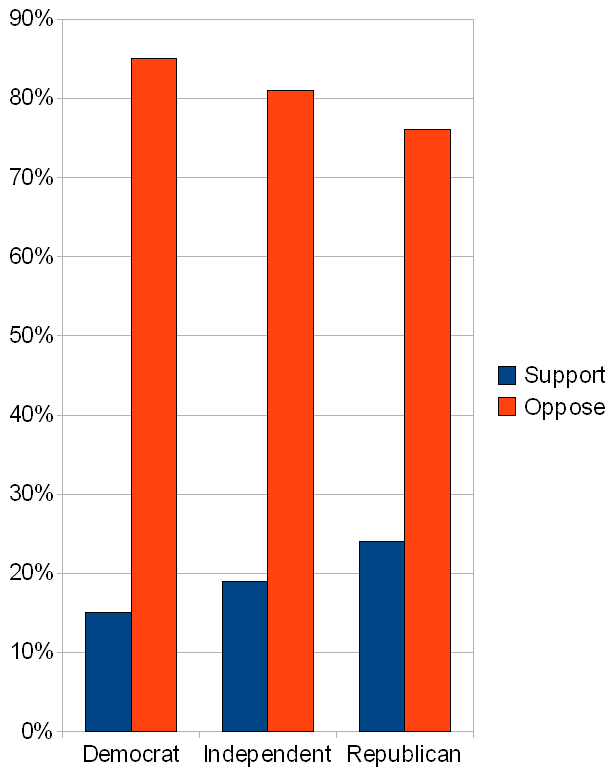No, I will not explain what kryptonite is. You should
know that already.
So here's the story. Back in 2010, the Supreme Court heard a case known as Citizens United V. The Federal Electoral Commission. Citizens United is a conservative group that wanted to air a movie about Hillary Clinton that they had creatively titled Hillary: The Movie. The strange part of all this was that they wanted to air it back in 2008 - the appeal didn't reach SCOTUS for about a year and a half.
It's really all convoluted. The history of the case is so twisted and ridiculous, I'm surprised that the higher courts are able to remember what it is they are voting on. I kid you not, SCOTUS benched the case in August of '08, heard oral arguments in March of '09, and then issued an order in June of '09 for the parties to reargue their cases in September of '09. The vote, by the way, wasn't made until January of 2010.
In the end, the court ruled in favor of Citizens United by a vote of 5-4. Justice Kennedy, who authored the majority opinion, found that "2 U.S.C. § 441(b)'s prohibition of all independent expenditures by corporations and unions was invalid and could not be applied to spending such as that in Hillary: The Movie. Kennedy wrote: 'If the First Amendment has any force, it prohibits Congress from fining or jailing citizens, or associations of citizens, for simply engaging in political speech.' He also noted that since there was no way to distinguish between media and other corporations, these restrictions would allow Congress to suppress political speech in newspapers, books, television and blogs."
The case marked the day that it became legal for corporations to spend money backing political candidates of their choice. I'm sure you've all heard why. "Money equals speech," is a common argument supporting SCOTUS's decision, as well as "corporations are people."
The ruling also allowed "Super PAC's" to form. What is a Super PAC, you ask? "PAC" stands for "Political Action Committee." They "can raise unlimited sums from corporations, unions and other groups, as well as individuals" and "are required to disclose their donors, just like traditional PACs. However many exploit a technicality in the filing requirements in order to postpone disclosure until well after the elections they participate in."
...Yay...
Allowing corporations to have a say in our electoral process is like injecting someone that's sick with the flu virus with cancer cells. And no, that's not hyperbolic. What's the point in a thousand people voting if ten CEO's can just throw their money at a candidate and buy the win for him? Democracy doesn't work when a few people with money have more sway than everyone else.
Just to really nail this idea home, here is the dissenting opinion, written by Justice Stevens...
"At bottom, the Court's opinion is thus a rejection of the common sense of the American people, who have recognized a need to prevent corporations from undermining self government since the founding, and who have fought against the distinctive corrupting potential of corporate electioneering since the days of Theodore Roosevelt. It is a strange time to repudiate that common sense. While American democracy is imperfect, few outside the majority of this Court would have thought its flaws included a dearth of corporate money in politics."
Which all brings me to the main point of this post. Recently, the city of my birth - Portland, Maine - made national headlines the other day when the city council got together and voted 6-2 "to call on the state's congressional delegation to support an amendment to the U.S. Constitution abolishing 'corporate personhood'."
While the vote had no legal impact, it was a giant step in the right direction. ThinkProgress writes...
“I can’t think of a more important thing to talk about than democracy. It is being threatened,” said Eric Johnson, a small-business owner from Portland. “You need to help us be heard. There is no more important issue.”The measure’s sponsor said the Occupy Wall Street movement inspired him to submit the non-binding resolution. Maine’s two congressmen, Rep. Mike Michaud (D) and Chellie Pingree (D) have both been critical of the Citizens decision, as has Sen. Olympia Snowe (R-ME).
Anna Trevorrow said, “It is absolutely the business of the City Council. The community has come together and asked you to make a statement.”
Mayor Michael Brennan, along with [Councilor David] Marshall and councilors Kevin Donoghue, John Anton, Jill Duson and Nicholas Mavodones, supported the resolution.
This is fantastic news and, if you don't believe me, I urge you to click on the ThinkProgress link above and read the comments that everyday citizens have posted. If you're from Maine like I am, it will make you smile from ear to ear. I guarantee it.
I'm not talkin' out my ass here, folks. And if you don't believe that, check out this image of the ABC-Washington Post poll from February of 2010.
I'm no statistician, but it seems as though
a lot of people oppose SCOTUS's ruling on this one...
One last thing - AND THIS IS IMPORTANT. Seriously. I never type in all caps. If you're like me and you think that it's about time that this decision gets reversed, then I urge you to head to Senator Bernie Sanders (I-VT) website and sign the petition for The Saving American Democracy Act. As of the time of this posting, it has over 190,000 signatures so far.
You can read all about the amendment on the site. It has a great bullet-point preview of what it's all about (for those of you who aren't heavy readers), and even a video of Senator Sanders from the YouTubes.
So what are you waiting for?!? Go here and sign the petition. Right meow.



No comments:
Post a Comment